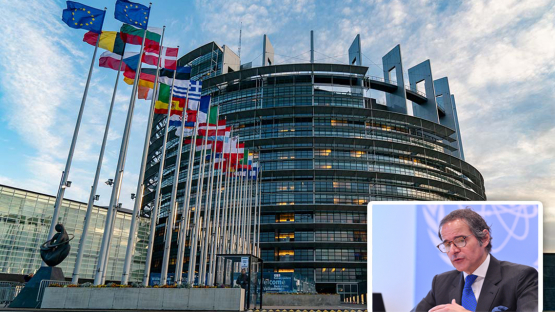At the European Parliament this morning, IAEA Director General Rafael Mariano Grossi emphasized the importance of the European Union as a major partner and supporter of the IAEA, especially in the area of safeguards, security and safety. During his exchange with MEPs, he called for even closer cooperation to address global challenges related to non-proliferation, climate change and sustainable development worldwide. Mr Grossi spoke through video link during a joint hybrid session of the Subcommittee on Security and Defence (SEDE), the Committee on Foreign Affairs (AFET) and the Committee for Industry, Research and Energy (ITRE) – the first time for an IAEA Director General to speak at the European Parliament.
The IAEA is a vehicle through which the European Union can achieve its Agenda for a Renewed Multilateralism and fulfil its Agenda 2030, Mr Grossi stated. “I believe that your noble objectives of: ‘strengthening global recovery and tackling inequalities;’ of ‘winning the race against climate change and restoring our relationship with nature;’ and of ‘building partnerships and alliances’ will be easier to achieve when you work with, and support, the IAEA,” Mr Grossi stated in the virtual exchange.
Since 2008, the EU has contributed approximately €140 million, including €10.8 million in 2020, in extrabudgetary funds to the IAEA. The contributions have been pivotal in supporting projects in nuclear safety and security, as well as technical cooperation, to ensure all nations benefit from the peaceful uses of nuclear technology.
Mr Grossi highlighted the scope of the Agency’s work and its relevance to achieve the Sustainable Development Goals. “Nuclear techniques and technologies help countries protect their crops, protect their health through nuclear medicine all over the world,” he said. Furthermore, “the IAEA is an indispensable player when it comes to fighting, for example, plastic pollution through isotopic tracers.”
In light of the pandemic, the IAEA launched ZODIAC, a major initiative to prevent future outbreaks of diseases that spread from animals to humans. “By using nuclear-derived technologies to detect viruses and antibodies in animals and humans, we will build up the defences of countries at the forefront of these outbreaks,” Mr Grossi stated. “It will be nuclear’s contribution to reducing the chance that the world falls victim again to a devastating pandemic like COVID-19. We see many EU Member States increasing their contributions to our activities in the area of nuclear applications.”




